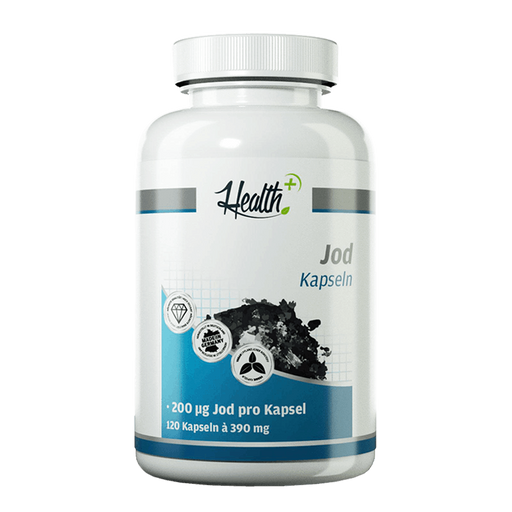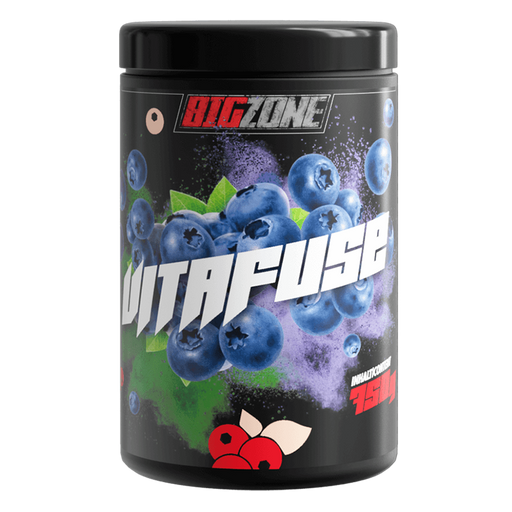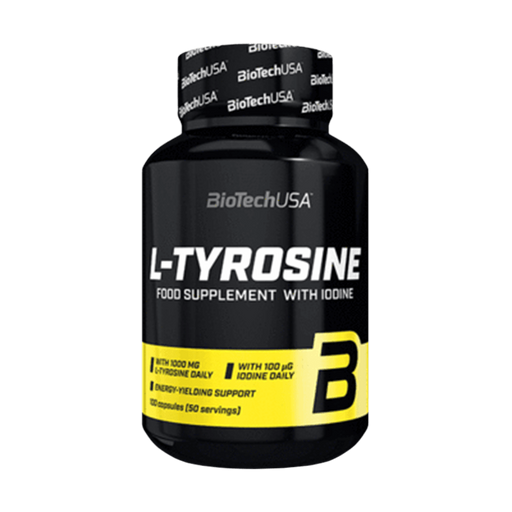Iodine
Filters
-
 Save 0%
Save %
Original price €14,90 - Original price €14,90Original price €14,90€14,90€14,90 - €14,90Current price €14,90| /
Save 0%
Save %
Original price €14,90 - Original price €14,90Original price €14,90€14,90€14,90 - €14,90Current price €14,90| /Iodine Health+ · 120 capsules
Zec+1 reviewThe HEALTH+ iodine capsules contain 200 mcg (micrograms) of iodine from potassium iodide (also: potassium iodide) per capsule This covers 100 % of ...
View full detailsOriginal price €14,90 - Original price €14,90Original price €14,90€14,90€14,90 - €14,90Current price €14,90| /Save 0% Save % -
 Save 0%
Save %
Original price €34,90 - Original price €34,90Original price €34,90€34,90€34,90 - €34,90Current price €34,90| /
Save 0%
Save %
Original price €34,90 - Original price €34,90Original price €34,90€34,90€34,90 - €34,90Current price €34,90| /Nectar Multivitamin · 90 capsules
Gods Rage85 reviewsMultivitamin is probably one of the most popular dietary supplements on the market. A supplement for a number of benefits, it's no wonder so many p...
View full detailsOriginal price €34,90 - Original price €34,90Original price €34,90€34,90€34,90 - €34,90Current price €34,90| /Save 0% Save % -
 Save 11%
Save %
Original price €36,90Original price €36,90 - Original price €36,90Original price €36,90Current price €32,84€32,84 - €32,84Current price €32,84| /
Save 11%
Save %
Original price €36,90Original price €36,90 - Original price €36,90Original price €36,90Current price €32,84€32,84 - €32,84Current price €32,84| /Vitafuse · 750g
Big Zone1 reviewdelicious taste Vitamin complex with minerals and fiber All in One Drink High-quality raw materials Incl. dosing spoon
Original price €36,90Original price €36,90 - Original price €36,90Original price €36,90Current price €32,84€32,84 - €32,84Current price €32,84| /Save 11% Save % -
 Sold out
Original price €16,90 - Original price €16,90Original price €16,90€16,90€16,90 - €16,90Current price €16,90| /
Sold out
Original price €16,90 - Original price €16,90Original price €16,90€16,90€16,90 - €16,90Current price €16,90| /L-Tyrosine · 100 capsules
Biotech USANo reviewsFunctional amino acid product in capsule form with added iodine Tyrosine can be produced by the body from phenylalanine Tyrosine occurs naturally ...
View full detailsOriginal price €16,90 - Original price €16,90Original price €16,90€16,90€16,90 - €16,90Current price €16,90| /Sold out
Iodine is a non-metallic element from the group of halogens. Its chemical symbol is I and it has the atomic number Z = 53 in the periodic table of elements. Pure iodine (iodine) is black-grey with a metallic sheen and changes to a gaseous state at room temperature (sublimation). When heated, it forms violet vapors that are highly irritating to the eyes and mucous membranes of the respiratory tract. Its name is derived from the Greek word "ioeides" = violet, violet-like. It is the 70th most common element on the earth's surface. Iodine was first discovered as an element by the French chemist Bernard Courtois (1777-1838) in 1811. In nature, it occurs in low concentrations in the soil, in certain rocks, in lakes, the sea and even in the air. Industrially, it is mainly extracted from Chilean saltpetre deposits or from seaweed. Iodine is rarely used in the technical industry. Iodine is an essential trace element. In medicine, it is used as a disinfectant, as a thyroid medication and as an X-ray contrast agent. As a dietary supplement, it is added to table salt in the form of sodium potassium iodate. In the event of radioactive contamination of the environment, such as after the reactor accident in Chernobyl, it is available in state storage facilities as potassium iodide so that it can be taken in increased quantities for a few days. This "saturates" the thyroid gland with harmless iodine and reduces the incorporation of radioactively contaminated iodine. Hyperthyroidism or thyroid cancer, on the other hand, are treated with radioactive iodine. For this purpose, the patient is administered a capsule containing the iodine isotope I 131 with an activity of approx. 100 mCi in the case of thyroid cancer and 5-50 mCi in the case of hyperthyroidism. Another application of iodine is the removal of mercury from carpets. Iodine charcoal is used for this purpose. Iodine is found in sea fish, iodized table salt and to some extent also in drinking water. It is incorporated into the thyroid hormones. Too little iodine in food and drinking water leads to enlargement of the thyroid gland (goitre), among other causes. The areas of the world where there is a lack of iodine are known as iodine deficiency areas. Germany is one of the iodine-deficient areas, with iodine deficiency being particularly pronounced in mountainous regions. This iodine deficiency is caused by the ice ages, during which the iodine deposits were washed out by the meltwater.
Thyroid hormones
Iodine plays a decisive role in the synthesis of thyroid hormones. Around 80% of the iodine consumed daily is used in the thyroid gland. A lack of thyroid hormones (hypothyroidism), on the other hand, has negative effects on the growth and development of the body. A lack of thyroid hormones can lead to severe physical and mental underdevelopment, particularly in the early stages of physical development, i.e. during the embryonic period and in childhood. Therefore, the healthy function of the thyroid gland is particularly important in these phases of life, which can only be guaranteed by an adequate supply of iodine.
The two most important thyroid hormones are
Triiodothyronine (T3) and tetraiodothyronine (T4), known as thyroxine for short. As can be seen from the names of the hormones, iodine is an essential component. T3 contains three iodine molecules and T4 accordingly four. Iodine must be ingested with food. The daily iodine requirement is 200 µg (millionths of a gram). The iodine enters the thyroid gland from the gastrointestinal tract with the blood and is incorporated into the thyroid hormones after several intermediate steps, including iodination and iodization. An average of 100 µg T4 and 10 µg T3 are produced daily and stored in the thyroid gland. The hormones are then released into the blood as required. In the blood, over 99% of both hormones are bound to transport proteins and only a very small proportion is present as free, i.e. unbound hormone. This is referred to as free T3 (FT3) and free T4 (FT4). Only the free hormones are metabolically active. The half-life of T3 is twenty hours, that of T4 eight days. In this case, the half-life is the time after which the amount of these hormones originally present has been reduced by half. The production of thyroid hormones is controlled by a feedback mechanism in higher-level centers in the brain, the hypothalamus and the pituitary gland.
Foods containing iodine
The most important sources of iodine are sea fish and seafood. Cod and haddock are particularly rich in iodine. Meat and dairy products are also good sources of iodine, although not all types of cheese, as iodine is sometimes lost during fermentation. Bread and other foods should be salted with iodized salt to guarantee a minimum supply.
Iodine deficiency
The symptoms of iodine deficiency, which leads to an underactive thyroid gland (hypothyroidism), usually appear gradually, so that no symptoms are noticed at first. Only when hypothyroidism becomes more severe do those affected complain of
- Tiredness
- Lack of drive
- Growth and development disorders in children
- Increased need for sleep
- Concentration problems
- Sensitivity to cold
- Constipation, i.e. constipation
Patients are generally slower in activity and attention. The skin is dry, cool, pale and often puffy as a result of increased fluid retention in the subcutaneous fatty tissue. This change is known as myxedema. The patient's voice is rough and hoarse due to myxedema of the vocal cords, and speech is often slurred and slurred due to myxedema of the tongue. The patient's pulse is slowed and muscle reflexes are weakened. In older patients, only some of these symptoms are often present. Here, weakness and weakness, sensitivity to cold and constipation dominate. Mild forms of hypothyroidism are therefore often overlooked.
Overdose and poisoning
If you follow the manufacturer's recommendations when taking iodine-containing supplements, there is generally no risk of overdosing. However, if you have hypothyroidism, even small amounts of iodine can be harmful due to impaired thyroid function. Table salt mixed with iodine contains very small amounts of iodine; 1 kg of iodized salt contains only 20 mg of the mineral, so an overdose can be practically ruled out in this way. Iodine tablets or iodine supplements in food supplements are also not harmful to health if taken in the correct dosage. However, some algae used in Asian cuisine contain a lot of iodine - these so-called kombu algae are not to be confused with the relatively low-iodine nori leaves used in the preparation of sushi! Stiftung Warentest found that 1 kg of kombu seaweed can contain up to 3.8 mg of iodine, almost twice as much as iodized salt (NaI). It should be mentioned that there is virtually no iodine in "normal" table salt, i.e. sodium chloride (NaCl). People who suffer from an iodine allergy should not take iodine-containing supplements without a doctor's recommendation and, in the case of an upcoming radiological examination with iodine-containing contrast agents, should carefully consider the necessity of using the substances with the doctor treating them. An overdose of iodine, e.g. if 1000 µg, i.e. 1 mg, is taken daily, initially leads to gastrointestinal complaints and skin rashes. In the case of an extreme overdose, the mouth and throat may turn brown and there may be significant gastrointestinal disorders, as well as dizziness, shock and shortness of breath. Mucous membrane burns with bleeding and kidney hemorrhages may also occur. The lethal dose is approx. 3 g of iodine. In case of iodine poisoning, water mixed with flour or a solution of 15 g sodium thiosulphate in 500 ml water should be drunk. Careful gastric lavage with a 1% sodium thiosulphate solution or with starch flour can also be carried out. Shock control and treatment of pain may also be necessary.
Prevention of iodine deficiency
Iodine deficiency can be reduced by the consistent use of iodized table salt. Eating sea fish twice a week is also recommended, as sea fish contains a lot of iodine. To ensure that you meet your daily requirement, you can also take iodine supplements, which are recommended for competitive athletes and especially for pregnant and breastfeeding women and women who wish to have children.
Iodine requirement
According to the German Society for Nutrition, the daily iodine requirement for children and older people is 180 µg, for adolescents and middle-aged adults 200 µg. Pregnant women and nursing mothers should consume 230 to 260 µg per day. By increasing the consumption of iodized salt in recent years, the iodine supply of the population has improved; however, it is assumed that there is still a daily deficit of at least a third or even half of the recommended amount.
Demand in sport
Athletes may have a slightly higher iodine requirement due to the increased activity of the thyroid glands. Nevertheless, a daily dose of 300mcg should not be exceeded.
Safety and side effects
Iodine is probably safe and harmless for most people when taken orally in the recommended amounts or applied to the skin with appropriate use of approved products. Iodine can cause significant side effects in some people. Common side effects include nausea, stomach pain, runny nose, headache, metallic taste and diarrhea. In sensitive people, iodine can cause side effects including swollen lips and face (angioedema), severe bleeding and bruising, fever, joint pain, enlargement of lymph nodes, allergic reactions including hives and death. Large amounts of iodine or long-term use of iodine may not be safe and harmless. Adults should avoid prolonged use of doses above 1100 mcg per day without medical supervision. In children, the following doses should not be exceeded:
- Children from 1 to 3 years: 200 mcg iodine
- Children from 4 to 8 years: 300 mcg iodine
- Children from 9 to 13 years: 600 mcg iodine
- Children aged 14 and over: 900 mcg iodine
In children and adults, there are concerns that higher doses may increase the risk of side effects such as thyroid problems. Iodine in higher doses can cause a metallic taste, pain around the teeth and gums, burning in the mouth and throat, increased salivation, sore throat, upset stomach, diarrhea, deterioration, depression, skin problems and many other side effects. If iodine is used directly on the skin, it can cause skin irritation, spots on the skin, allergic reactions and other side effects. You should not bandage areas of skin that have been treated with iodine too tightly to avoid iodine burns.
Precautions and warnings
Pregnancy and lactation: Iodine is probably safe and harmless during pregnancy and lactation when taken orally in the recommended amounts or when used appropriately on the skin in the form of an approved product (2% solution). Oral administration of higher doses may not be safe and harmless. Pregnant and lactating women over the age of 18 should not take more than 1100 mcg of iodine per day and women between the ages of 14 and 18 should not exceed 900 mcg of iodine per day. Higher doses could cause thyroid problems.
Autoimmune thyroid diseases: People who suffer from autoimmune thyroid disorders may be particularly sensitive to the harmful side effects of iodine. Thyroid disorders such as hypothyroidism, enlarged thyroid gland (goitre) or thyroid tumors: Prolonged intake of iodine could aggravate these disorders.
Interactions
Iodine should not be taken in combination with the following medications:
Medication for the treatment of hyperthyroidism
Iodine can affect the thyroid gland. Taking iodine in combination with medication to treat hyperthyroidism could reduce thyroid function too much. For this reason, you should not take iodine if you are taking medication to treat hyperthyroidism. Care should be taken when using iodine in combination with the following medications:
Amiodarone
Amiodarone contains iodine. Taking iodine supplements in combination with amiodarone could result in excessive iodine levels in the blood. Too much iodine in the blood can cause side effects that affect the thyroid gland.
Lithium
Lithium can inhibit thyroid function. Taking lithium in combination with iodine could have additive or synergistic inhibitory effects on thyroid function. For this reason, thyroid function should be monitored when taking lithium and iodine.
Medication for high blood pressure (ACE inhibitors, angiotensin receptor blockers)
Some high blood pressure medications may slow potassium excretion. Most iodine supplements contain potassium. Taking potassium iodide in combination with some high blood pressure medications could result in excessive potassium levels in the body. For this reason, potassium iodide should not be used if you are taking medication for high blood pressure.
Potassium-sparing diuretics
Most iodine supplements contain potassium. Some diuretics, known as potassium-sparing diuretics, can increase potassium levels in the body. Taking potassium iodide in combination with potassium-sparing diuretics could result in excessively high potassium levels in the body. For this reason, potassium iodide should not be used when taking potassium-sparing diuretics.




